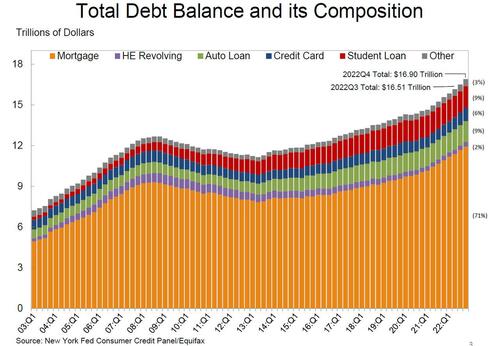
The latest note from Morgan Stanley analyst Adam Jonas does anything to instill confidence in an auto industry that, as we have been noting, has been part and parcel to a tidal wave of rising consumer debt.
The note, released Tuesday morning, notes that "auto loan delinquencies have moved through pre-COVID and GFC highs, yet US auto demand remains extremely resilient on an adjusted basis".
First, the note says that unit sales have been depressed, with Jonas writing: "US light vehicle sales are materially off their pre-COVID highs. Trailing 3-month US SAAR as of Feb 2023stands at 15.0mn units, which is 11% below Feb 2020 3-month trailing average of 17.1mn units, and improvement from Feb 2022 where 3-month trailing average of SAAR was 17% below Feb 2020 levels."
But the "mixed messages" come in when one looks at pricing, Jonas says. "Recent conversations with dealers have suggested demand for new and used vehicles remains strong despite rising interest rates, deteriorating credit metrics and a pull-back in financial institution willingness to lend," he writes.
The U.S. value of SAAR is at an all-time high despite the restrictive monetary conditions. "On a value-of-SAAR basis, the US auto consumer is currently purchasing new vehicles at an all time record high rate. A feat even more impressive given the movement in average interest rates."
Jonas asks how much longer consumers can handle the sky-high prices for vehicles, and notes that while auto pricing remains firm, housing is falling. Generally, we'd expect autos to fall first, as one Zero Hedge contributor wrote this week, but that isn't the case so far.
Jonas writes: "Initially lower housing starts was offset by median prices that climbed through Nov 2022, but since the pricing peak, median home prices have fallen 14% through January, resulting in the value of housing being down 21% through January from its peak. This differs from autos where continued increases in pricing have completely offset the decline in unit sales."
"We are the first to admit we would have thought there would have been more weakness at these levels for this long, but at least some significant portion of the auto consumer is showing to be more resilient than we would have thought."
Despite the fact that Jonas sees mixed messages, it still remains relatively clear to us that a cool-off of major proportions for the auto industry is likely on its way. First, remember that, as we noted months ago, current purchases could be coming at a cost: one industry CEO said that taking on a second vehicle financing while defaulting on the first was becoming commonplace in the industry.
And as we noted two weeks ago, total household debt in the fourth quarter of 2022 rose by 2.4% or $394 billion, the largest nominal quarterly increase in twenty years, to a record $16.90 trillion. Among that debt, auto loan balances increased by $28 billion in the fourth quarter, consistent with the upward trajectory seen since 2011.
The latest note from Morgan Stanley analyst Adam Jonas does anything to instill confidence in an auto industry that, as we have been noting, has been part and parcel to a tidal wave of rising consumer debt.
The note, released Tuesday morning, notes that “auto loan delinquencies have moved through pre-COVID and GFC highs, yet US auto demand remains extremely resilient on an adjusted basis”.
First, the note says that unit sales have been depressed, with Jonas writing: “US light vehicle sales are materially off their pre-COVID highs. Trailing 3-month US SAAR as of Feb 2023stands at 15.0mn units, which is 11% below Feb 2020 3-month trailing average of 17.1mn units, and improvement from Feb 2022 where 3-month trailing average of SAAR was 17% below Feb 2020 levels.”
But the “mixed messages” come in when one looks at pricing, Jonas says. “Recent conversations with dealers have suggested demand for new and used vehicles remains strong despite rising interest rates, deteriorating credit metrics and a pull-back in financial institution willingness to lend,” he writes.
The U.S. value of SAAR is at an all-time high despite the restrictive monetary conditions. “On a value-of-SAAR basis, the US auto consumer is currently purchasing new vehicles at an all time record high rate. A feat even more impressive given the movement in average interest rates.”
Jonas asks how much longer consumers can handle the sky-high prices for vehicles, and notes that while auto pricing remains firm, housing is falling. Generally, we’d expect autos to fall first, as one Zero Hedge contributor wrote this week, but that isn’t the case so far.
Jonas writes: “Initially lower housing starts was offset by median prices that climbed through Nov 2022, but since the pricing peak, median home prices have fallen 14% through January, resulting in the value of housing being down 21% through January from its peak. This differs from autos where continued increases in pricing have completely offset the decline in unit sales.”
“We are the first to admit we would have thought there would have been more weakness at these levels for this long, but at least some significant portion of the auto consumer is showing to be more resilient than we would have thought.”
Despite the fact that Jonas sees mixed messages, it still remains relatively clear to us that a cool-off of major proportions for the auto industry is likely on its way. First, remember that, as we noted months ago, current purchases could be coming at a cost: one industry CEO said that taking on a second vehicle financing while defaulting on the first was becoming commonplace in the industry.
And as we noted two weeks ago, total household debt in the fourth quarter of 2022 rose by 2.4% or $394 billion, the largest nominal quarterly increase in twenty years, to a record $16.90 trillion. Among that debt, auto loan balances increased by $28 billion in the fourth quarter, consistent with the upward trajectory seen since 2011.
Loading…








